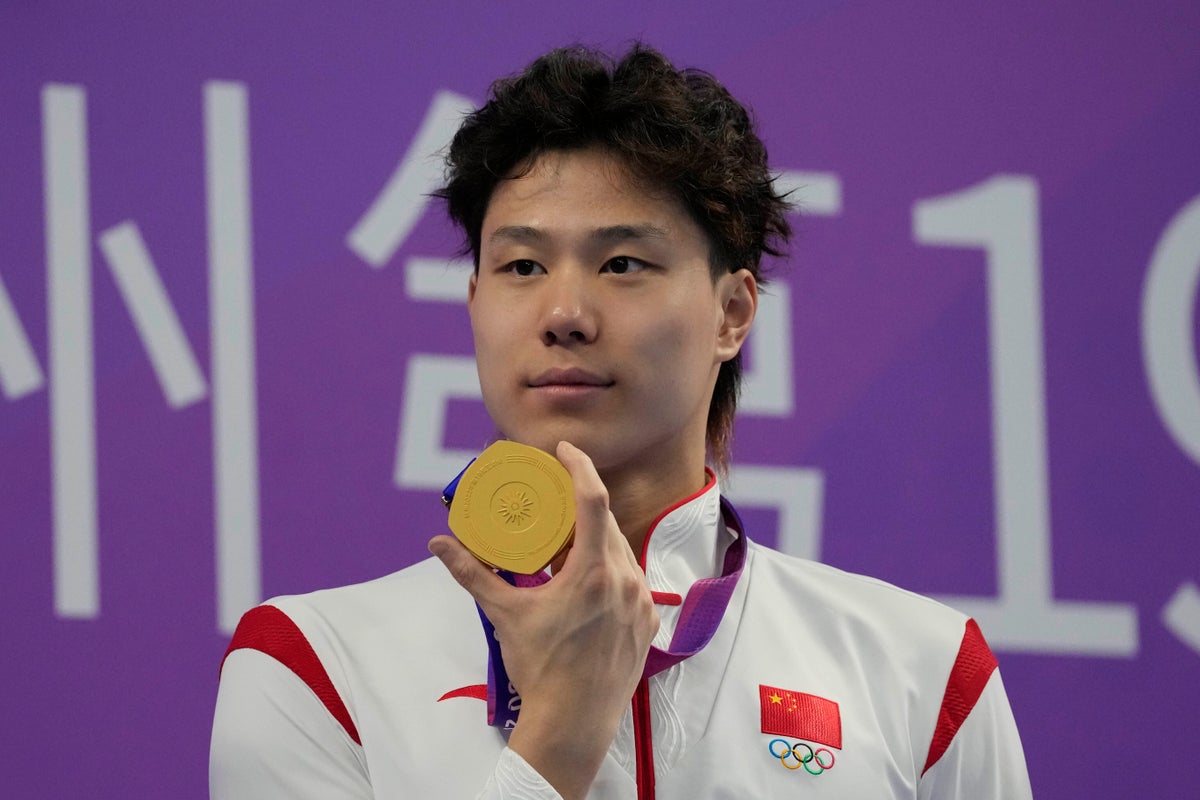
Support truly
independent journalism
Chinese swimmer Qin Haiyang has released a statement accusing American and European athletes of conspiring to distract Chinese athletes from their Olympic preparations by challenging the World Anti-Doping Agency’s (Wada) handling of Chinese athletes who were found to have violated doping rules ahead of the Tokyo Olympics.
It was recently revealed that 23 Chinese swimmers tested positive for trimetazidine, a heart medication banned due to its ability to boost one’s endurance, at a training camp held seven months before the Tokyo Games. Of the athletes who tested positive, 11 are set to compete in Paris.
Wada claim that they could not properly investigate the case because of the Covid-19 pandemic, choosing not to challenge the Chinese Anti-Doping Agency’s (Chinada) claim that the drug was ingested accidentally due to contamination in a hotel kitchen. No clear explanation was given for the cause of the contamination, and reports from German broadcaster ARD claim that not all of those who tested positive stayed in the same accomodation.
Ultimately, given the lack of concrete evidence, no formal accusation was leveled, leaving a large proportion of Paris Olympians are not happy with Wada’s handling of the affair.
The decision not to investigate has drawn major backlash led by the US Anti-Doping Agency and prompted an FBI investigation into Wada’s actions. Haiyang took to social media to refute the accusations, writing “This proves that the European and American teams feel threatened by the performances of the Chinese team in recent years.
“Some tricks aim to disrupt our preparation rhythm and destroy our psychological defence! But we are not afraid. When you have a clear conscience, you do not fear slander. The team is currently preparing at the established pace. My teammates and I will resist the pressure and win more medals to silence the sceptics!”
By “tricks,” Haiyang may be referring to the fact that Chinese athletes have reportedly been tested for doping as many as seven times each since arriving in Paris 10 days ago, as claimed by team nutritionist Yu Liang.
Chief among the “sceptics” is Caeleb Dressel, a seven time gold medalist hailing from Florida. When asked whether he was confident in Wada’s investigation or Chinada’s excuse, he flatly responded: “No, not really.” Australia’s Zac Stubblety-Cook concurred, calling the investigation a failure of the system and hinting that he had considered protesting the decision when he competes.
“At the end of the day, I’m a clean athlete and I’m trying to abide by those rules and I just hope my competitors do the same,” Stubblety-Cook added.
President of the US Anti-Doping Agency (Usada), Travis Tygart, has gone so far as to call Wada the IOC’s “lapdog,” a claim which left Wada president Witold Banka “speechless.” He went on to admit that his relationship with Usada has become “difficult.”
The fallout has led the US Federal Bureau of Investigation to open an investigation into Wada’s activities at the request of the House select committee on China. The committee’s chair, Rep John Moolenaar, stated that “This incident raises serious coincerns and may constitute a broader state-sponsored strategy by the People’s Republic of China to unfairly compete at the Olympic games.”
On the investigation, Wada admit that they are “disappointed” by the FBI’s decision, and have responded by taking Usada to court for a compliance review, the result of which could see the US lose its right to host the 2028 and 2034 Olympics. A hearing is set to take place in August at the Court for Arbitration of Sport.
The DOJ’s authority on the case is based in the Rodchenkov Anti-Doping Act of 2019, which authorizes Congress to “impose criminal sanctions on certain persons involved in international doping fraud conspiracies,” as well as to make reparations with the “victims” of such conspiracies. The law also states that investigators are to work alongside Usada “to assist its fight against doping.”
The fallout is set to overshadow the first full day of Olympic competition, during which a full programme of swimming events will be contested, with the first medal events due to take place in the evening.
Following the accusations, Wada has doubled down on its authority, releasing a statement outlining its plans to combat doping during the Olympics, including the presence of an Independent Observer and an athlete-led “engagement team” stationed in the Olympic village, which will be tasked with “[raising] awareness about doping-free sport.” The statement adds that Wada will be operating “normally,” downplaying the situation at hand.







